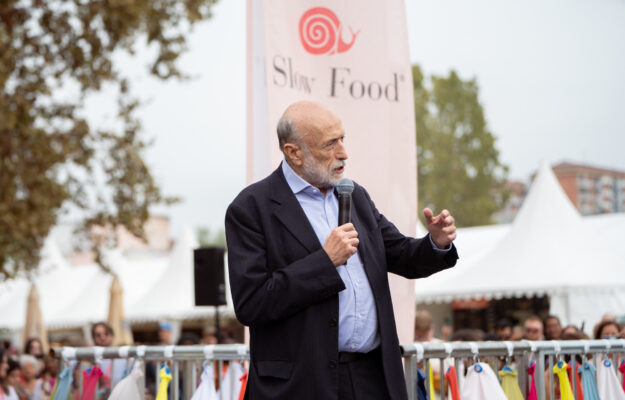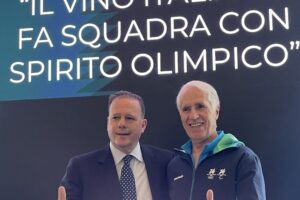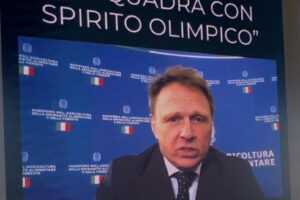The need for a profound paradigm shift on the agricultural front and in the approach to food, more respectful towards a Planet that risks being irreversibly overturned by climate change; the centrality of the farmers and woman farmers work all around the globe, to be sustained even with a “farmer’s income”, for example, but to be also protected in the fight against exploitation by gangmasters, which is always unacceptable, but even more so in those territories where agriculture produces highly valuable products, "like the bottles of wine sold for 60-70 euros, in my Langhe"; the role of cooks as the core of a food community and as the best ambassadors of their territories; the value of the world's food communities as places of dialogue and peace, where the future is built: these are the messages launched by Carlin Petrini, founder of Slow Food, from Terra Madre 2024, which we have told you about with articles and interviews, in recent days, in Turin (and others will follow, ed.), which brought together delegates from the great food network from all over the world, and experts from different sectors, to discuss the future of food and agriculture, which coincide with that of humanity. Which must free itself from the slavery of consumerism. These are historical topics that have always been at the heart of Slow Food’s actions, and of Terra Madre for 20 years, and which WineNews has explored in depth with Petrini himself.
“We have entered a crucial historical phase that won’t last a few years, but will most likely continue for several decades, or perhaps a few centuries, called as of the ecological transition. The last historical phase lasted three centuries and was that of the industrial revolution, but one of the fundamental paradigms of the period of the industrial revolution was to accumulate capital to be reinvested to make a profit. This reality, which was also based, but not only, on the centrality of profit and gross domestic product, was, to a certain extent, an element of very relevant individual behaviours, where we all accepted this dimension of compulsive consumerism. Well, this reality of compulsive consumerism did not take into account one thing, the only truth: the resources of the Planet are not infinite", explains Petrini, that adds: “Today we have become aware that the Planet's resources are finite, and it is therefore important to change paradigms by putting very clear founding values at the centre, being aware that the value and also the well-being of a nation, of a community, cannot be measured only through the gross domestic product, but by the levels of education, of health. Ours is a community that needs to see that profits, even if increasing, go mainly into the hands of a few, and not also to those who have less. And, therefore, this dimension in value, in recognizing the value of food, is a dimension that changes the state on which we have based a good part of our existence”.
These are crucial issues that the founder of Slow Food Petrini has been discussing with Pope Francesco for some time now, Pope who has shown a degree of awareness on these aspects that the politics of today and yesterday have not always had. "We must say that, at a global level, diversified interests and movements are manifesting themselves - Petrini comments - unfortunately, in the last year, even in the justified protests of the farmers' movements, which claimed the right to be the ones to set prices and not to suffer the prices imposed on them by large-scale distribution, these claims have meant, for a good part of the political class, identifying in the "New Green Deal" an element that is against the economy. And so, instead of discussing and dialoguing, this vision has been destroyed, succeeding in the fact of setting the farmers against the environmentalists. But, be careful, because the situation of environmental disaster, which is already in place and will grow more and more, calls for different realities. But luckily, when this choice was to be made - continues the founder of Slow Food - an election campaign was underway. The president of the European Union herself, Ursula von der Leyen, who immediately called into question the "New Green Deal", once the elections were held and having been forced to incorporate the Environmentalists and Greens Party into her majority, recognized that, within a year, the "New Green Deal" will have to be implemented. We need a movement that starts from the bottom and that has clear ideas on these issues".
More than that, on one hand the prices of alimentary products are raising, and on the other, the farmers are asking for a fair income, lamenting that, in the actual state, keeping on is impossible. But why this discrepancy, to which we must also add a lack of consideration for the particularity of the products we eat compared to other products, such as electronics and wellness? “That is because, unfortunately, the suffering - as Carlin Petrini further explains Carlin - that for centuries passed through food shortages, also in our country, has led now, for over 50 years, to focus all production by virtue of reducing the price, reducing the price and, again, reducing the price. Today we have reached a level where reducing more than this is no longer possible. When I was young, food accounted for about 35% of a family's salary, while today it's less than 9%. The time has come to question all this and to emphasize that it is not on the price that we must focus, but on the value of food and on the report of the relationships that this has. Unluckily neither the value nor the relationships are found in the balance sheets, but it must be clear that without all of this, the balance sheets fail”.
Relationships, such as those between agriculture and labor, or those between production and distribution systems, consumers and workers, which have returned to the forefront, in recent months, due to the many news, even dramatic, related to the issue of gangmastering. Which must be defeated forever, because it is unacceptable and, in some cases, even more than others. “There is no doubt that the critical element is to transfer a good part of the work into the hands of this multitude of underpaid people. Now that this happens in front of tons of tomatoes that have a low added value, it is not tolerable but it has its logic, at least that of dealing with the low cost that is recognized for certain productions. But gangmastering occurring in an economy where the value is not the one of a few kilos of tomatoes, but is a value worth between 50-60 euros per bottle... I am talking about my Langhe and their Barolo and Barbaresco, this is shameful. From this point of view - Petrini highlights - blame is put on the cooperatives making big speculations. But, be careful, because if these cooperatives organize the staff that comes to your vineyard, working on your territory, you have the moral duty to know how much they pay these employees, and, if you don’t have this information and you are not ensuring that it is a fair remuneration, you are an accomplice. And, therefore, I think that, also from this point of view, if we want to reason about a correct relationship between citizen and producers, citizens have the right to be informed of who carries out these policies... I choose not to buy wine from those companies”.
Many, many themes, strongly linked to the same vision that has always guided Slow Food, that of “good, clean and fair” food. As well as, moreover, the cultural battle to bring knowledge of food and the culture of the seasons of agriculture into schools, reiterated once again by “Terra Madre”, by Carlo Petrini and by Slow Food, calling Palazzo Chigi into question: “the Italian government must support food education, the environmental situation is complicated, we are losing biodiversity and the climate crisis is shifting crops, creating enormous damage. That said, we have two options: either we follow the multinationals that bypass rural reality, or we stand with Terra Madre that supports local economies. We cannot influence multinationals, but we can influence local economies - Carlo Petrini underlined - and we must conceive these days at "Terra Madre" as a moment of cultural enrichment to acquire the elements to return home and make alliances. With producers, fishermen, breeders, even chefs, and above all with citizens who I don’t call "consumers", because it is a term that, in my opinion, contains a principle of morbidity. Alliances should develop from the bottom, because that is where the strongest bonds are created, and because small experiences are always better than nothing. Otherwise, our agricultural production risks being suffocated by a food policy based on compulsive consumerism, a scheme that wastes food: we produce 12 billion but there are 8 of us, so we throw away 33%. Meanwhile, every year, in the world, millions of people die of hunger, including children. We must convince others to ally with “Terra Madre” and we must become political protagonists in our own way”.
And, in a context that brings together so many people from around the world, it is impossible not to look at current events, as Petrini himself recalled while closing “Terra Madre” in Turin, a few days ago: “I would like “Terra Madre” 2024 to be dedicated to two friends, two delegates who were here with us in 2022: Dror Or, an Israeli cheese producer, and Bilal Saleh, a Palestinian oil producer in the West Bank. On October 7, terrorists kidnapped Dror and his children and killed his wife; a few months later he was found dead, while the children are fortunately safe. Saleh was killed on October 30, while he was in the olive grove, shot dead by a settler who shot him from the nearby village. “Terra Madre” is a place of peace, because people from all over the world come to Turin to talk. Without dialogue, without listening, without respect for diversity, there is no peace”.
Copyright © 2000/2026
Contatti: info@winenews.it
Seguici anche su Twitter: @WineNewsIt
Seguici anche su Facebook: @winenewsit
Questo articolo è tratto dall'archivio di WineNews - Tutti i diritti riservati - Copyright © 2000/2026
























































































































































































